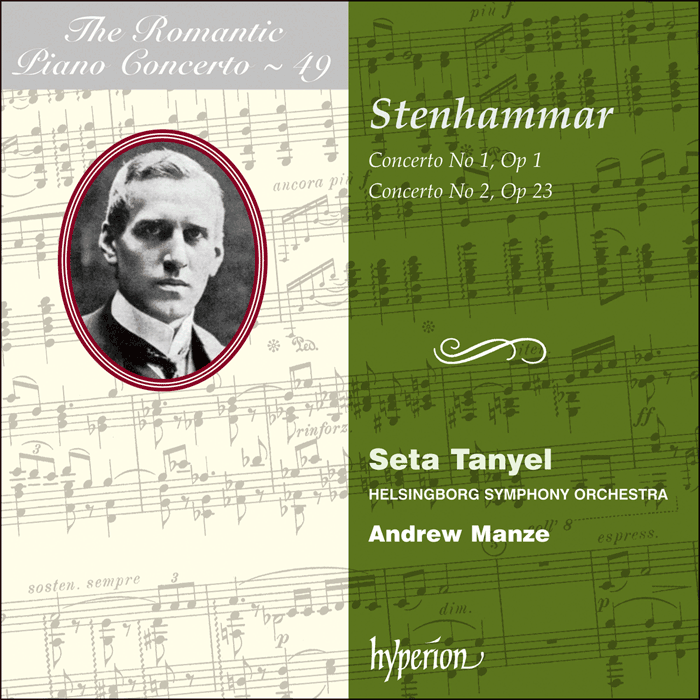Logowanie
Dziś nikt już tak genialnie nie jazzuje!
Bobby Hutcherson, Joe Sample
San Francisco
SHM-CD/SACD - NOWY FORMAT - DŻWIĘK TAK CZYSTY, JAK Z CZASU WIELKIEGO WYBUCHU!
Wayne Shorter, Freddie Hubbard, Herbie Hancock, Ron Carter, Elvin Jones
Speak no evil
UHQCD - dotknij Oryginału - MQA (Master Quality Authenticated)
Chesky! Niezmiennie perfekcyjny
Winylowy niezbędnik
ClearAudio
Double Matrix Professional - Sonic
najbardziej inteligentna i skuteczna pralka do płyt winylowych wszelkiego typu - całkowicie automatyczna
STENHAMMAR, Seta Tanyel, Helsingborg Symphony Orchestra, Andrew Manze
The Romantic Piano Concerto, Vol. 49
- Piano Concerto No 1 in B flat minor, Op 1
- 1 Movement 1: Molto moderato e maestoso – Sostenuto e tranquillo – Agitato [15'34]
- 2 Movement 2: Vivacissimo [4'30]
- 3 Movement 3: Andante [12'33]
- 4 Movement 4: Allegro commodo – Andante con moto [13'15]
- Piano Concerto No 2 in D minor, Op 23
- 5 Movement 1: Moderato – Allegro molto energico – Più tranquillo [9'18]
- 6 Movement 2: Molto vivace – Allegretto – Adagio – Molto vivace [6'28]
- 7 Movement 3: Adagio [6'43]
- 8 Movement 4: Tempo moderato – Animato – Più animato [6'50]
- Helsingborg Symphony Orchestra - orchestra
- Seta Tanyel - piano
- Andrew Manze - conductor
- STENHAMMAR
Welcome to a genuinely outstanding disc in the Romantic Piano Concerto series. Sometimes the works found along the unfrequented byways of the Romantic piano tradition can exhibit no more than surface brilliance, but that cannot be said of these two splendid concertos by Stenhammar, recorded for the first time together on one CD. The original orchestration of Stenhammar’s Piano Concerto No 1 is recorded here: a version which was long thought lost when the publishers were bombed during the second world war – a copy of the original was discovered in the Library of Congress in 1983. The twenty-two year old’s Opus 1 is a masterpiece, majestic and virtuosic at its opening; bringing the listener into a world of Nordic mystery at the start of the third movement; the finale ending with music of sad, reflective sweetness. The second concerto is a distinctly different work, with an novel, some have said ‘improvised’, structure, and a sense of tension between soloist and orchestra which is only resolved in the glorious virtuosic finale. Hyperion is delighted to present the distinguished musician Andrew Manze in his new incarnation as a conductor. Directing the Helsingborg Symphony Orchestra, he is truly a force to be reckoned with. Pianist Seta Tanyel has featured on previous RPC recordings, always gaining the highest critical acclaim; however her magnificent playing on this new disc transcends her previous achievements. -------------------------------------------- 'Hyperion's 49th is a real humdinger … [Second Concerto] Few will be able to resist the tumultous finale. Manze was a shrewd choice of conductor, as was Seta Tanyel as soloist, a pianist whose lyrical grace is matched by a no-holds-barred bravura and an innate sparkle that makes her the preferred choice over the excellent Mats Widlund in the First Concerto (Chandos). The recorded sound is of Hyperion's usual high standard' (Gramophone) 'Wilhelm Stenhammar's two piano concertos are astonishing works, and their neglect outside the composer's native Sweden is shameful. As with much of his output, they derive their complexity and strength from his need to find an individual voice while also staking a claim for a place in the evolving symphonic tradition that includes Beethoven and Brahms. The latter's Second Piano Concerto was Stenhammar's structural starting point in each instance, but while his vast First Concerto (1893) swerves between the enormity of epic and the intimacy of folk song, the taut, embattled Second (1909) places piano and orchestra in terse opposition until the tension is eventually released in one of the most forceful slow movements ever composed. The performances, bigger in scope and scale than any we've heard before, are exceptional. The soloist is Seta Tanyel, formidable in her declamatory intensity and lyrical weight. Andrew Manze, meanwhile, conducts with steely commitment' (The Guardian)


































